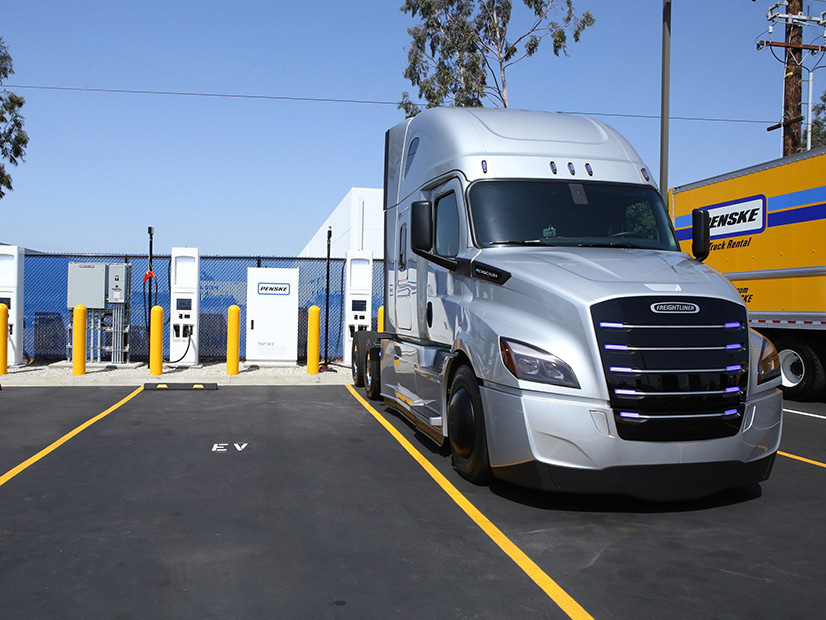A revised version of the New Jersey Board of Public Utilities (BPU) straw proposal designed to stimulate the development of chargers for medium- and heavy-duty (MHD) electric trucks would provide extra support for private fleets that put chargers in overburdened communities but would also place greater demands on the fleets.
The new proposal, which is scheduled for a public hearing on Jan. 17, seeks to “refine” the original package issued in June 2021 with several enhancements. Some were triggered by stakeholder arguments in a series of public hearings in August and September 2021 that with so many trucks working in and around overburdened communities, the BPU would need to offer more benefits to private fleets to get enough to act and significantly cut emissions in those areas.
The original proposal offered limited assistance to private fleets, mainly technical help provided by electric distribution companies. It focused on supporting the development of charging sites in overburdened areas that were open to the public.
The new package makes a private fleet eligible for incentives of up to 100% of the cost of “make ready” work — the pre-wiring of electrical infrastructure at a parking space for future installation of a charger — in overburdened areas. To receive the full subsidy, the fleet charging depot must be located in an overburdened community and must displace existing fossil-fueled vehicles rather than adding new electric vehicles to an existing fleet.
The fleet also must agree to participate in a “managed charging,” which requires it to charge vehicles in off-peak periods, generally overnight, to help reduce the load on the grid.
Legacy of Disinvestment
The MHD charger proposal is part of the state’s effort to cut emissions in its largest polluting sector, transportation, which accounts for about 42% of carbon emissions in the state. Long- and short-haul single unit and combination trucks account for 18% of the greenhouse gas emissions from road vehicles, with another 43% generated by light commercial and passenger trucks, according to the proposal.
At present, electric vehicles account for only a tiny number of the state’s 500,000 MHD trucks, which are major emissions contributors and are especially problematic to communities located near freight corridors, warehouses, distribution centers and ports.
The proposal says that although MHD trucks and buses account for only 4% of the vehicles on the road in New Jersey, they contribute nearly 25% of greenhouse gas emissions.
Gov. Phil Murphy wants the state to reach 100% clean energy by 2050, and the state’s 2019 Energy Master Plan assumes that 75% of medium-duty trucks and 50% of heavy-duty trucks will be electric by 2050.
“The physical and monetary costs of emissions in overburdened municipalities, particularly in urban settings, require ratepayer investment to ensure that EV adoption’s positive impacts are distributed equitably cross the state,” according to the proposal, which was released Dec. 22.
It adds that “staff is convinced that partial socialization of private fleet depots located in or primarily operating in overburdened municipalities is critical to meeting the governor’s commitment to improving environmental conditions in the communities struggling under the legacy of disinvestment and discrimination.”
The proposal does not require that a fleet depot to be located in the overburdened community to be eligible for benefits under the proposal. But if it isn’t, the fleet needs to “primarily operate” there, a phrase that has still to be defined but could include the fleet’s trucks driving a large portion of their mileage in the area, according to the proposal. In example, it cites the definition in the Zero-Emission Incentive Program (ZIP), which is run by the New Jersey Economic Development Authority (EDA) and awards purchase subsidies for light and medium trucks that in some circumstances hinge on the truck doing up to 50% of its miles in overburdened communities.
In another addition to the earlier proposal, the new package makes sites that install chargers higher than 500 kW, sometimes known as “ultra-fast” chargers, eligible to receive technical assistance from utility companies, who could then charge the cost to ratepayers. The earlier proposal allowed the utilities to provide technical assistance only to public and private fleets.
The assistance provided by the utilities is expected to range from picking site charging locations to planning for fleet and charging growth and determining “when, and if, additional grid support is needed,” according to the proposal.
The BPU straw proposal, in both the initial and revised forms, envisions private developers and investors installing, owning and operating EV service equipment and marketing the sites to customers. Utilities would help wire and provide the backbone infrastructure necessary but would not be able to own chargers developed under the program, except in certain circumstances, mostly when no other developer steps forward.
The proposal drew criticism from several fronts on its release. At one hearing, Zachary Kahn, senior policy adviser for Tesla, argued that the private fleets deserved more support because they were already making a serious investment in buying electric trucks and had shown they clearly had “significant skin in the game.”
An attorney for the Sierra Club, Zachary Fabish, said that regardless of whether a charger is private or publicly accessible, it would make the same contribution to reducing emissions and that is essential to combating climate change. (See NJ Electric Truck Rules Face Many Questions.)
In the latest proposal, the BPU says it is working to “define the appropriate level of ratepayer investment in this sector.”
“Many of the issues that this straw proposal seeks to explore include questions about who should construct, own, operate and pay for the MHD network necessary to make New Jersey a national leader in the adoption of electrified MHD fleets and the buildout of an MHD EV ecosystem,” the proposal states.



